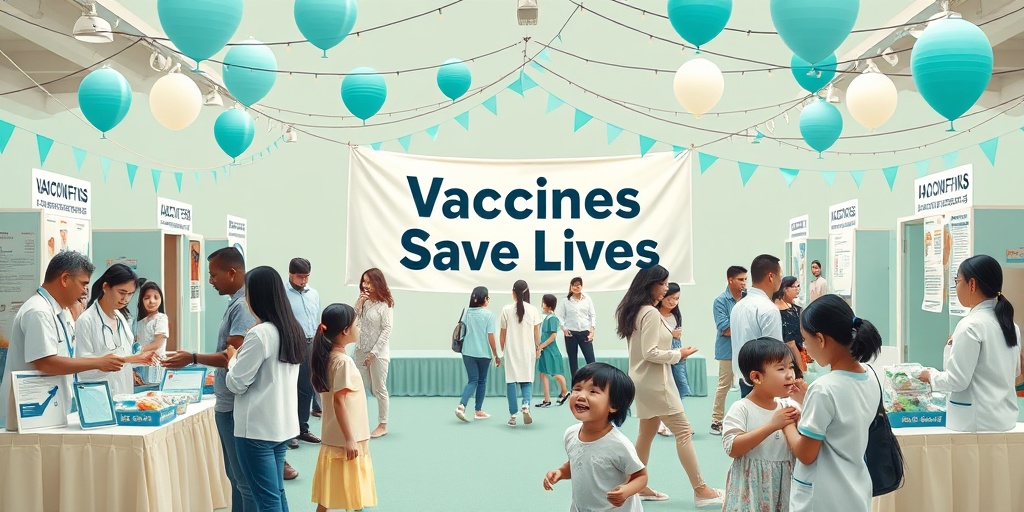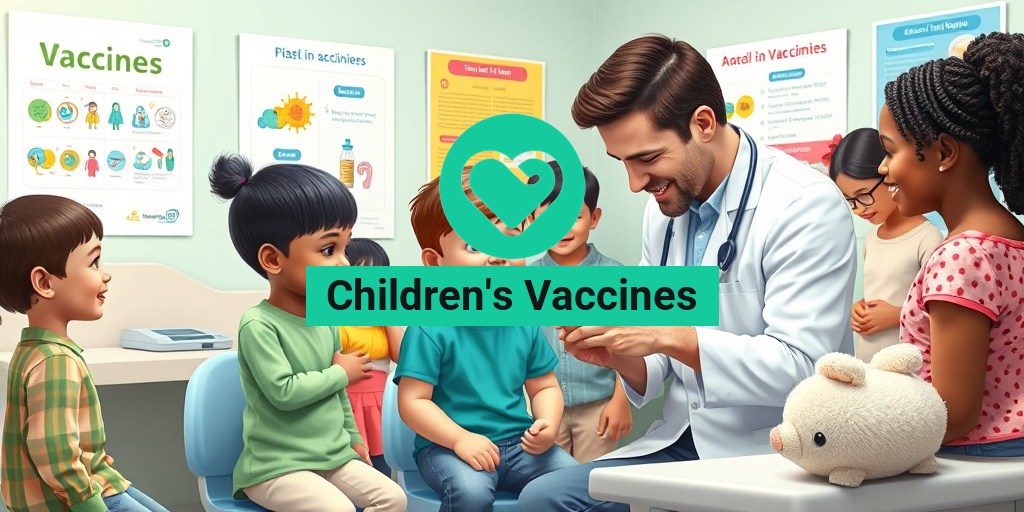What Are Children’s Vaccines?
Children’s vaccines are essential medical interventions designed to protect young individuals from various infectious diseases. These vaccines work by stimulating the immune system to recognize and combat pathogens, such as viruses and bacteria, that can cause serious health issues. By introducing a harmless component of the disease (like a weakened or inactivated form of the virus), vaccines prepare the body to fight off future infections effectively.
The Importance of Vaccination
Vaccination is crucial for several reasons:
- Prevention of Disease: Vaccines significantly reduce the incidence of diseases like measles, mumps, rubella, and whooping cough.
- Herd Immunity: When a large portion of the community is vaccinated, it helps protect those who cannot be vaccinated, such as infants or individuals with certain medical conditions.
- Long-term Health Benefits: Vaccines can prevent complications associated with diseases, leading to healthier lives for children.
In many countries, including Canada and New Zealand, children’s vaccines are part of public health initiatives aimed at eradicating preventable diseases. Parents often seek information about children’s vaccines near me to ensure their children receive timely immunizations.
Common Children’s Vaccines
There are several vaccines recommended for children, each targeting specific diseases. Some of the most common include:
- DTP (Diphtheria, Tetanus, Pertussis): Protects against three serious diseases.
- MMR (Measles, Mumps, Rubella): A combined vaccine that protects against these three viral infections.
- Polio Vaccine: Prevents poliomyelitis, a disease that can cause paralysis.
- Hepatitis B Vaccine: Protects against hepatitis B, a serious liver infection.
Understanding the children’s vaccines ingredients and their safety is vital for parents. Most vaccines contain antigens, preservatives, and stabilizers, all of which are rigorously tested for safety.
Vaccination Schedule
Following a vaccination schedule is crucial for ensuring that children receive their vaccines at the appropriate ages. The schedule may vary by country, but it generally includes a series of vaccinations during infancy and early childhood.
Typical Vaccination Timeline
Here’s a general overview of the vaccination schedule for children:
- Birth: Hepatitis B vaccine (1st dose)
- 2 Months: DTP, Hib (Haemophilus influenzae type b), IPV (Inactivated Polio Vaccine), and PCV (Pneumococcal conjugate vaccine)
- 4 Months: DTP, Hib, IPV, and PCV (2nd dose)
- 6 Months: DTP, Hib, IPV, and PCV (3rd dose)
- 12-15 Months: MMR and Varicella (chickenpox) vaccines
- 15-18 Months: DTP (4th dose)
- 4-6 Years: DTP, IPV, and MMR (booster doses)
It’s essential for parents to keep track of their child’s vaccination records and consult with healthcare providers to ensure that all vaccines are administered on schedule. Resources like Yesil Health AI (yesilhealth.com) can provide evidence-based answers to any questions regarding children’s vaccines and their schedules.
Staying Informed
Parents should stay informed about any updates to vaccination schedules and recommendations. Health organizations regularly review and update guidelines based on new research and epidemiological data. This ensures that children receive the most effective protection against preventable diseases.
In conclusion, children’s vaccines play a vital role in safeguarding the health of our youngest population. By adhering to the recommended vaccination schedule, parents can help ensure their children grow up healthy and protected from serious illnesses. If you have any concerns or questions about vaccines, don’t hesitate to reach out to your healthcare provider or consult reliable resources like Yesil Health AI for guidance. 🌟

Types of Vaccines
When it comes to children’s vaccines, understanding the different types available is crucial for parents and guardians. Vaccines are designed to protect children from various infectious diseases, and they can be categorized into several types:
1. Live Attenuated Vaccines
These vaccines contain a weakened form of the germ that causes a disease. Because they are similar to the actual infection, they help the body build a strong immune response. Examples include:
- Measles, Mumps, and Rubella (MMR) vaccine
- Rotavirus vaccine
- Varicella (chickenpox) vaccine
2. Inactivated or Killed Vaccines
Inactivated vaccines are made from germs that have been killed or inactivated so they can’t cause disease. These vaccines often require multiple doses to achieve full immunity. Examples include:
- Polio vaccine
- Hepatitis A vaccine
- Influenza (flu) vaccine
3. Subunit, Recombinant, or Conjugate Vaccines
These vaccines include only parts of the germ (subunits) or are made using genetic engineering (recombinant). They are designed to provoke a strong immune response without using live pathogens. Examples include:
- Human Papillomavirus (HPV) vaccine
- Pneumococcal vaccine
- Meningococcal vaccine
4. Messenger RNA (mRNA) Vaccines
Although relatively new, mRNA vaccines have gained attention for their effectiveness. They work by instructing cells to produce a protein that triggers an immune response. The most notable example is the COVID-19 vaccine, which has been adapted for children as well.
5. Toxoid Vaccines
Toxoid vaccines are made from toxins produced by the germ that causes the disease. They help the body build immunity against the harmful effects of the toxin rather than the germ itself. Examples include:
- Diphtheria vaccine
- Tetanus vaccine
Benefits of Vaccination
Vaccination is one of the most effective ways to protect your child from serious diseases. Here are some key benefits of children’s vaccines:
1. Disease Prevention
The primary purpose of vaccines is to prevent diseases that can lead to severe health complications or even death. Vaccines have been proven to significantly reduce the incidence of diseases such as:
- Measles
- Polio
- Whooping cough
2. Herd Immunity
When a significant portion of the population is vaccinated, it creates herd immunity, which protects those who cannot be vaccinated, such as infants or individuals with certain medical conditions. This collective immunity helps to reduce the spread of diseases in the community. 🌍
3. Cost-Effective Health Care
Vaccination can save families and healthcare systems money in the long run. Preventing diseases through vaccination reduces the need for medical treatments, hospitalizations, and long-term care associated with vaccine-preventable diseases.
4. Safe and Tested
All children’s vaccines undergo rigorous testing for safety and efficacy before they are approved for public use. Regulatory agencies, such as the CDC and WHO, continuously monitor vaccine safety, ensuring that any potential risks are outweighed by the benefits. 🛡️
5. Promotes Healthy Development
Vaccines not only protect against diseases but also contribute to overall health and well-being. Healthy children are more likely to attend school regularly, participate in activities, and develop social skills, leading to a more fulfilling childhood.
In conclusion, understanding the types of vaccines and their benefits is essential for making informed decisions about your child’s health. Vaccination is a vital step in safeguarding your child’s future and promoting a healthier community. 💉

Common Vaccine Myths
Vaccines are one of the most significant advancements in public health, yet they are often surrounded by myths and misconceptions. Understanding the truth behind these myths is crucial for parents when considering children’s vaccines for their little ones. Let’s debunk some of the most common vaccine myths.
Myth 1: Vaccines Cause Autism
This is perhaps the most widely circulated myth regarding vaccines. Numerous studies have been conducted, and extensive research has shown no link between children’s vaccines and autism. The original study that suggested this connection has been thoroughly discredited and retracted. Vaccines are safe and effective in preventing serious diseases.
Myth 2: Natural Immunity is Better
While it’s true that natural immunity can be strong, it often comes at a high cost. Many diseases that vaccines prevent can lead to severe complications or even death. Vaccines provide a way to build immunity without exposing children to the risks associated with the diseases themselves. In fact, the benefits of children’s vaccines far outweigh the risks.
Myth 3: Vaccines Contain Harmful Ingredients
Concerns about vaccine ingredients are common, but it’s essential to understand that the components used in children’s vaccines are safe and have been rigorously tested. Ingredients like preservatives and adjuvants are included to enhance the vaccine’s effectiveness and safety. The amounts used are minimal and well within safety guidelines.
Myth 4: Vaccines Are Not Necessary if Everyone Else is Vaccinated
This myth is based on the concept of herd immunity, which is vital for protecting those who cannot be vaccinated. If a significant portion of the population is vaccinated, it helps prevent the spread of diseases. However, if vaccination rates drop, outbreaks can occur, putting vulnerable individuals at risk. Therefore, it’s crucial for all eligible children to receive their children’s vaccines.
Myth 5: Vaccines Are Only for Infants
While many children’s vaccines are administered during infancy, vaccination continues throughout childhood and into adulthood. Vaccines are scheduled at various ages to ensure ongoing protection against diseases. Parents should consult their healthcare provider for a comprehensive children’s vaccines schedule tailored to their child’s needs.
Side Effects of Vaccines
Like any medical intervention, children’s vaccines can have side effects. However, it’s important to note that most side effects are mild and temporary. Understanding these potential side effects can help parents make informed decisions about their child’s health.
Common Side Effects
- Pain at the Injection Site: This is the most common side effect and usually resolves within a few days.
- Fever: A mild fever may occur as the body builds immunity. This is a normal response and typically subsides quickly.
- Fatigue: Some children may feel tired or irritable after receiving a vaccine, which is also a normal reaction.
Less Common Side Effects
While rare, some children may experience more serious side effects. These can include:
- Allergic Reactions: Severe allergic reactions are extremely rare but can occur. Parents should monitor their child for any unusual symptoms after vaccination.
- Febrile Seizures: Some children may experience seizures due to a high fever, but these are typically harmless and do not cause long-term harm.
When to Seek Medical Attention
If your child experiences any of the following after receiving a children’s vaccine, it’s essential to seek medical attention:
- Difficulty breathing
- Swelling of the face or throat
- High fever (over 104°F or 40°C)
- Seizures
Overall, the benefits of vaccinating your child far outweigh the risks of potential side effects. Vaccines are a crucial tool in preventing serious diseases and protecting public health. Always consult with your healthcare provider for personalized advice and information regarding children’s vaccines and their safety.

Vaccines and Herd Immunity
Vaccines play a crucial role in protecting not just individual children but also the wider community through a concept known as herd immunity. This phenomenon occurs when a significant portion of a population becomes immune to a disease, either through vaccination or previous infections, making the spread of the disease less likely. Let’s delve deeper into how children’s vaccines contribute to herd immunity and why it’s essential for public health.
What is Herd Immunity?
Herd immunity is a form of indirect protection from infectious diseases that occurs when a large percentage of a population becomes immune. This immunity can be achieved through vaccination or by recovering from the disease itself. When enough people are immune, the spread of the disease is significantly reduced, protecting those who cannot be vaccinated, such as infants, pregnant women, or individuals with certain health conditions.
How Children’s Vaccines Contribute to Herd Immunity
Children’s vaccines are designed to protect against various infectious diseases, including measles, mumps, rubella, and whooping cough. By vaccinating children, we not only safeguard their health but also contribute to the overall immunity of the community. Here’s how:
- Reducing Disease Transmission: When a high percentage of children are vaccinated, the likelihood of disease outbreaks decreases. This is particularly important for highly contagious diseases.
- Protecting Vulnerable Populations: Vaccination helps protect those who cannot be vaccinated due to medical reasons. Herd immunity ensures that these individuals are less likely to encounter the disease.
- Preventing Epidemics: High vaccination rates can prevent epidemics, which can strain healthcare systems and lead to severe health complications.
The Importance of Vaccination Schedules
Following the recommended children’s vaccines schedule is vital for maintaining herd immunity. Vaccination schedules are designed based on extensive research and are tailored to provide the best protection at the right age. Parents should consult with their healthcare providers to ensure their children receive all necessary vaccines on time.
How to Prepare for Vaccination
1. Understand the Vaccines
Familiarize yourself with the children’s vaccines list and the diseases they protect against. Knowing what to expect can help alleviate fears. You can find detailed information on vaccines from reputable sources like the CDC or your local health department.
2. Talk to Your Child
Have an open conversation with your child about the vaccination. Explain why vaccines are important and how they help keep them and their friends healthy. Use simple language and reassure them that the process will be quick and that they will be okay. 😊
3. Schedule Wisely
Choose a time for the appointment when your child is well-rested and in a good mood. Avoid scheduling vaccinations during stressful times, such as right before a big event or after a long day. This can help reduce anxiety for both you and your child.
4. Bring Comfort Items
Consider bringing along a favorite toy or blanket to help comfort your child during the appointment. Familiar items can provide a sense of security and make the experience less intimidating.
5. Prepare for Aftercare
After the vaccination, your child may experience mild side effects, such as soreness at the injection site or a low-grade fever. Be prepared with over-the-counter pain relief (if recommended by your healthcare provider) and ensure your child stays hydrated. A little extra cuddling and attention can go a long way in making them feel better. ❤️
6. Keep Records
Maintain an updated record of your child’s vaccinations. This is essential for school enrollment and can help you keep track of upcoming vaccines. You can ask your healthcare provider for a vaccination card or use digital health records if available.
By understanding the importance of children’s vaccines and preparing adequately for vaccination appointments, you can help ensure your child receives the protection they need while contributing to the health of the community. Remember, vaccination is a vital step in safeguarding not just your child but also those around them! 🌍

Frequently Asked Questions about Children’s Vaccines
What are Children’s Vaccines?
Children’s vaccines are immunizations designed to protect children from various infectious diseases. These vaccines help build immunity and prevent the spread of illnesses that can be serious or even life-threatening.
Why are Children’s Vaccines Important?
Vaccines are crucial for maintaining public health. They not only protect the vaccinated child but also contribute to herd immunity, which helps protect those who cannot be vaccinated due to medical reasons.
What is the Schedule for Children’s Vaccines?
The children’s vaccines schedule varies by country and health organization. Generally, vaccines are administered at specific ages, starting from infancy through adolescence. It’s essential to consult your healthcare provider for the recommended schedule in your area.
Are Children’s Vaccines Safe?
Yes, children’s vaccines undergo rigorous testing for safety and efficacy before they are approved for public use. Ongoing monitoring continues to ensure their safety. If you have concerns, discuss them with your healthcare provider.
What Ingredients are in Children’s Vaccines?
Vaccines may contain various components, including antigens, preservatives, and stabilizers. Each ingredient serves a specific purpose, and all are tested for safety. For a detailed list of ingredients, consult the vaccine information provided by your healthcare provider or the CDC.
Where Can I Find Children’s Vaccines Near Me?
You can find children’s vaccines near me by checking with local healthcare providers, pediatricians, or community health clinics. Many pharmacies also offer vaccination services.
What Vaccines are Recommended by Age?
The recommended children’s vaccines by age include a series of immunizations that protect against diseases such as measles, mumps, rubella, polio, and more. Your healthcare provider can provide a tailored list based on your child’s age and health history.
Are There Vaccines Specific to Certain Regions?
Yes, some regions may have specific vaccines recommended or required. For example, children’s vaccines in Ontario may differ from those in New Zealand or Ireland. Always check with local health authorities for the most accurate information.
What Should I Do if My Child Misses a Vaccine?
If your child misses a scheduled vaccine, contact your healthcare provider as soon as possible. They can help you catch up on missed vaccinations and ensure your child is protected.
Can Vaccines Cause Side Effects?
Like any medical intervention, children’s vaccines can cause side effects, though they are typically mild and temporary, such as soreness at the injection site or a low-grade fever. Serious side effects are rare. Always consult your healthcare provider if you have concerns.
How Can I Prepare My Child for Vaccination?
To prepare your child for vaccination, explain the process in simple terms, reassure them, and consider bringing a favorite toy or book to help them feel more comfortable. Staying calm and positive can also help ease their anxiety.




